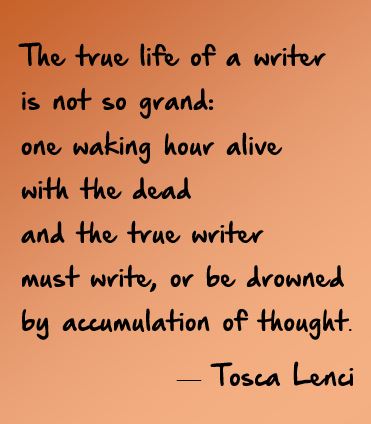 The true life of a writer is not so grand: one waking hour alive with the dead and the true writer must write, or be drowned by accumulation of thought….
The true life of a writer is not so grand: one waking hour alive with the dead and the true writer must write, or be drowned by accumulation of thought….
The writer-archetype is born chimerically pre-suicidal, as much a part of the vocation as is language. The author, alone, weeps more times than not; surely not only when asleep. Every hour is an essay; thoughts unless written refuse to die even when it feels that the thinker ought to. Only when thoughts have become written words can they be destroyed.
Language without emotion moves nothing. Why cry?—well, suffering is not so bad if only it paid? Meanwhile, a true writer entertains psychological pain to near-injurious degree, exploring fully in mind the lives of every person seen. One follows each day projecting a requisite public persona, which as yet has not been betrayed by the intractable Muse. Beneath the pain is the Muse’s legacy of uncognized collective knowledge, and the Muse must be served! Any joy found
along the way is brief—joy is in the words on the page, if one is lucky to achieve a bit of linguistic artistry—words which Time may warrant to live beyond the life of the hands that released them.
Another hour of Life…shall this be the ‘final’ essay? Perhaps, the writer by the east window thinks, drawing lightly on suicidal fuel this fog-laden morning. A magenta oleander hides the outside world, of which the Muse needs no reminding. That totality exists ever-unbrokenly in mind: all the confused suffering of all Time’s people, in whom Life always begins the same—each an unmarked tablet at birth full unto itself, prepared to live a good and happy story. Individual paths travel all history; billions of one plot are lived; millions, written; and all lament, while one great tale alone could sum all the relative emotions.
The true writer rarely feels at home. No external structure, irrespective how large or grand, can be called home. Home for the writer is all the feeling felt by everyone for whom home is a permanent place. The writer lives inside a Moveable Drama that cuts through the myriad of repetitions of the human condition. If the writer is to vanquish the Muse’s appetite, the writer’s home is the writer’s room: only the space surrounding a thought.
Humanness is captured best in what is not said; the true gift enables a reader to feel the words left unwritten. Recollected this hour is one master who dredged emotion between the lines, as the Muse finds itself hovering under the Arch of Triumph with old friends—Remarque, and Ravic and Joan Madou. Time moves us on (as Remarque lived it, consequently as Ravic knew); even when joy is with one, so, also, is the end of it….
A few last minutes to grieve. Not for men and women of incomplete lives, born to exist only to be deprived. Not for Ravic…. Not even for Joan Madou?—dying beauty, so like a cat, choicelessly subject to whatever Fate gives it?—
Ah…finally! In the hour’s last seconds the writer senses the Muse’s meaning. Every emotion has a fixed extreme. Once an emotion has been tapped completely, one is disengaged from its constellation….
Long ago, this writer had cause to exhaust total grief but did not. Now, in these renewed moments under the Arch of Triumph, the writer briefly became child again. Thought caused Mind to equate Nazi mentality with the indifference of a long-ago guardian, who callously divested a young girl of her most beloved companion….
Now the Muse watches the writer weep, weeping for all of nameless abandoned Life. Not, however, for a beautiful woman and a faultless man—for a small black cat, with the sweetest of faces. Yet there is a dart-like ray of joy in it!—to see for an instant as Ravic saw; to stoically accept as he accepted. Stripped truth is one certainty that can be held forever by Mind, like an insect frozen in amber. Far beyond merely being able, is the point where one wills to stay alive—and write—for endurance has become all.
Tosca Lenci
